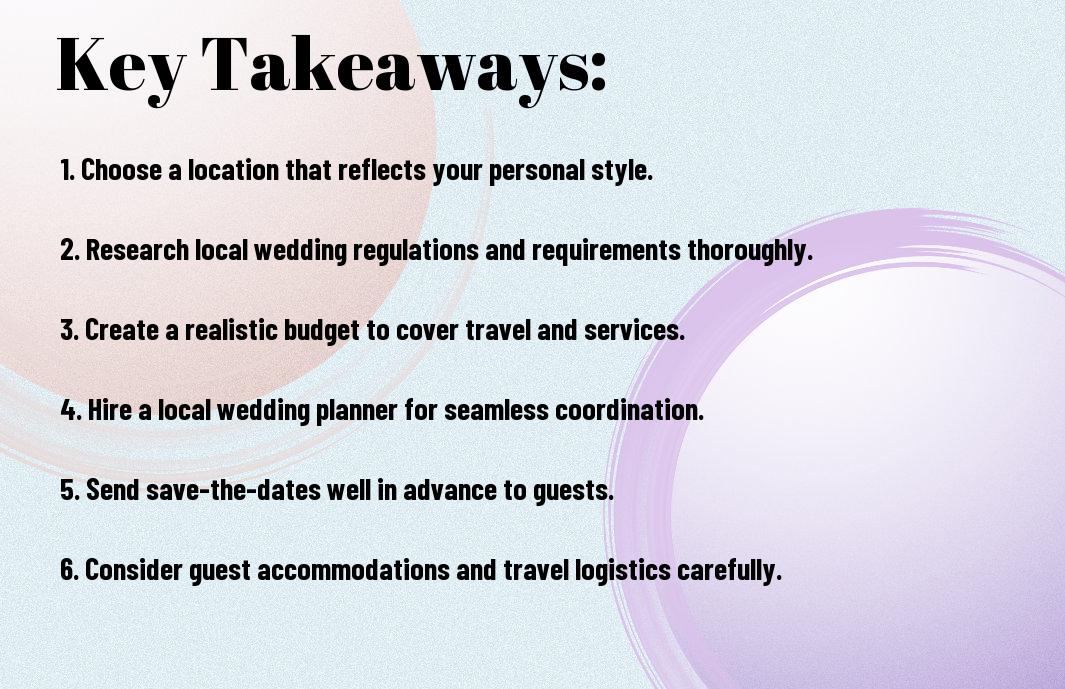You may feel inspired to make a difference in the world by volunteering abroad, and planning your trip can be a rewarding experience. This guide will provide practical steps to help you organize your adventure, from selecting the right program to preparing for your journey. We’ll cover necessary considerations like budget, safety, and cultural immersion to ensure your volunteer experience is fulfilling and impactful. Let’s investigate the details to equip you with the knowledge needed for a successful volunteer trip abroad.

Key Takeaways:
- Research your destination thoroughly to understand the local culture, customs, and needs of the community you will be assisting.
- Select a reputable organization or program that aligns with your interests and values to ensure a positive volunteer experience.
- Prepare for logistical aspects such as travel documents, vaccinations, and fundraising, to create a smooth and impactful trip.
Understanding Volunteer Opportunities Abroad
For those considering a volunteer trip, it’s crucial to comprehend the various opportunities available. These programs can vary greatly in their focus, location, and impact, allowing you to find an experience that aligns with your skills and interests. Before committing, take the time to research, evaluate, and choose a program that resonates with your personal values and desired contributions.
Types of Volunteer Programs
For you to effectively navigate the myriad of volunteer options, it’s important to know the different types of programs offered.
- Environmental Conservation
- Wildlife Protection
- Community Development
- Education and Teaching
- Healthcare Services
The options are vast, catering to diverse skills and personal interests.
| Program Type | Description |
| Environmental Conservation | Focuses on protecting ecosystems and promoting sustainable practices. |
| Wildlife Protection | Involves conservation efforts for endangered species and their habitats. |
| Community Development | Aims to improve infrastructure and living conditions in local communities. |
| Education and Teaching | Supports educational initiatives, often in under-resourced schools. |
| Healthcare Services | Provides support in clinics or health education outreach initiatives. |
Choosing the Right Focus Area
Along your journey to selecting a volunteer program, identifying the right focus area is vital in ensuring a meaningful experience. Evaluating your skills, interests, and the kind of impact you wish to make will guide your decision.
For instance, if you have a background in education, volunteering in an educational program may align with your expertise and allow you to make a significant impact. Alternatively, if you are passionate about environmental issues, seeking programs related to conservation could be more fulfilling. Assessing your motivations and the skills you bring, while considering the community needs, can enhance both your contribution and your personal experience abroad.
Researching Destinations
Assuming you have decided to go on a volunteer trip abroad, the next step is to research potential destinations. Look for countries with a strong volunteer culture, reputable organizations, and projects that align with your interests. Explore various factors such as climate, language, and local customs to ensure that your experience will be both meaningful and enjoyable. You might also want to consider the safety and political landscape of the destination to foster a trouble-free experience during your travels.
Popular Countries for Volunteer Work
Among the most popular countries for volunteer work are Thailand, Costa Rica, Brazil, and South Africa. These destinations offer diverse opportunities ranging from wildlife conservation to community development projects. Each country has unique causes and communities that welcome volunteers, allowing you to make a real impact while experiencing the local culture.
Cultural Considerations
Beside understanding the volunteer requirements and projects, you should consider cultural factors that can influence your experience. Being aware of local customs, traditions, and social norms can greatly enhance your interaction with the community and the people you will support.
The more you appreciate the cultural dynamics of your chosen destination, the smoother your integration will be. You may want to learn about traditional etiquette, common greetings, and even basic phrases in the local language. These small efforts demonstrate respect and can foster stronger connections with the people you are there to help. Also, be open to different cultural perspectives and practices, as this will enrich your volunteering experience and personal growth.
Selecting a Reputable Organization
Your choice of a reputable organization can significantly impact your volunteer experience abroad. Look for organizations with established histories, positive reviews, and transparency in their operational practices. A good organization will prioritize the well-being of both the volunteers and the communities they serve, offering you the chance to make a meaningful impact in a responsible manner.
Evaluating Program Credibility
Any organization you consider should provide clear information about their programs, including their mission, goals, and the communities they support. Research their success stories and read testimonials from past volunteers. Additionally, reach out to the organization for any clarifications you may have; their responsiveness can be a telling factor in their credibility.
Understanding Costs and Inclusions
An important aspect of planning your volunteer trip is understanding the costs involved and what is included in your fees. Some organizations will charge program fees that cover accommodation, meals, and training, while others may not.
In addition, you should inquire about any hidden costs such as visa fees, travel insurance, and additional activities outside of the program. Make a comprehensive list of what is included in the program fee, so you can budget accurately and avoid any unexpected expenses during your trip. Understanding the full financial picture ensures that you can make an informed decision that fits your budget and expectations.
Preparing for Your Trip
Unlike typical travel, planning a volunteer trip abroad requires careful consideration of various aspects to ensure a rewarding and smooth experience. You need to coordinate logistics like flights and accommodation while also understanding the cultural and environmental contexts of your chosen destination. Prior to departure, it is vital to establish communication with your host organization to clarify your role and responsibilities, as well as to gain any specific instructions that can help you settle in easily.
Required Documentation and Vaccinations
Among the most important steps in your preparation are obtaining the necessary documentation and vaccinations. You will likely need a valid passport, visa, and sometimes additional permits depending on the country and the nature of your volunteering work. Consulting with medical professionals to receive any recommended vaccinations will also help safeguard your health during your trip.
Packing Essentials for Volunteering
For your volunteering journey, packing can greatly impact your overall experience and effectiveness in the field. Ideally, you will want to bring items that are practical and suited to your tasks, as well as any necessary clothing that respects local customs and climates.
Understanding what to pack can make your volunteering experience more enjoyable and productive. Essential items typically include sturdy shoes for outdoor work, weather-appropriate clothing, and any specialized gear needed for your specific project. Additionally, consider bringing personal hygiene products, a reusable water bottle, and any necessary work tools. Don’t forget to reserve space for necessary paperwork and any medical supplies tailored to your health needs. A well-thought-out packing list can ensure that you’re fully prepared for your invaluable time spent volunteering abroad.
Fundraising for Your Volunteer Trip
To make your volunteer trip a reality, you’ll need to focus on effective fundraising strategies. This may involve tapping into personal networks, hosting events, or leveraging online platforms to gather contributions. Set a realistic budget, identify your financial goals, and start creating a plan that outlines how much you need to raise and by when. Being transparent about your intentions and the cause you’ll be volunteering for can inspire others to support you in your journey.
Creative Ways to Fundraise
On your fundraising journey, think outside the box to engage potential donors. Organize themed events, like bake sales or talent shows, and involve your community to raise awareness and support. You can also sell homemade goods or crafts, use social media campaigns, and consider crowdfunding platforms that cater to volunteer efforts. Get creative and share your passion to motivate others to join your mission.
Seeking Sponsorships and Grants
Grants and sponsorships from local businesses or organizations can significantly aid your volunteer trip. Research companies that align with your values or the project you’ll be involved in and craft a compelling pitch to secure their partnership. Consider local foundations or government programs that offer funding for volunteer initiatives, and prepare a proposal highlighting the benefits of your work abroad.
But securing sponsorships and grants requires diligence and a well-structured approach. Start by identifying potential sponsors who share an interest in your cause and demonstrate how your trip aligns with their values. Tailor your proposals to showcase not just what you need, but the impact your work will have in the communities you’ll serve. Developing relationships with these sponsors can open doors for additional funding opportunities and ongoing support as you prepare for your journey.
Making the Most of Your Experience
Once again, immersing yourself fully in your volunteer experience will greatly enhance the impact of your trip. Take the time to engage with your project, cultivate relationships with local communities, and embrace the new environment around you. By maintaining a positive attitude and being open to new experiences, you’ll not only contribute more effectively but also foster personal growth and cultural awareness that will last well beyond your journey.
Setting Goals for Your Volunteer Work
After establishing your pre-trip expectations, it’s vital to outline tangible goals for your volunteer work. Think about what skills you wish to gain, the type of impact you want to make, and how you can contribute to the community. Setting clear objectives helps to focus your efforts and provides a sense of achievement as you progress through your journey.
Cultural Immersion and Building Connections
Against the backdrop of your volunteer work, actively seeking opportunities for cultural immersion will deepen your understanding of the local environment. Take the initiative to engage with local customs, participate in community activities, and build relationships with the people you meet. These connections not only enrich your experience but also foster mutual respect and understanding.
With a genuine approach towards cultural immersion, you can create meaningful connections that enhance both your journey and the community’s well-being. Attend local events, share meals with families, or learn the language to further bridge any gaps. Engaging authentically with locals will provide you with invaluable insights, enrich your perspective, and allow you to form lasting relationships that can lead to future opportunities and collaborations.

Summing up
Now that you know the steps to effectively plan your volunteer trip abroad, you can confidently approach the process. Start by identifying your interests, researching volunteer programs, and considering how to fund your journey. Use resources to find opportunities and aim for a program that aligns with your goals and values. For advice on volunteering without financial burdens, check out How to Volunteer Abroad for Free. With careful planning, you can make a meaningful impact while exploring a new culture.
Q: What are the first steps to take when planning a volunteer trip abroad?
A: The initial steps in planning a volunteer trip abroad involve researching different volunteer programs that align with your interests and skills. Look for organizations that have a good reputation and positive reviews from past volunteers. After selecting a program, consider factors such as the duration of the trip, the location, and the type of work involved. It’s also helpful to assess your budget, as costs can vary widely depending on the destination and organization. Once you have a program in mind, ensure that you have the necessary travel documents, such as a passport and visa, if required.
Q: How can I ensure my volunteer trip is impactful and ethical?
A: To promote a positive impact through your volunteer work, research organizations that prioritize ethical practices. Participation in programs that employ local community members and focus on sustainable development is key. Read testimonials and case studies from previous volunteers to gauge the effectiveness of the organization. Additionally, reach out to the organization to ask questions about their mission, the community’s needs, and how your work will contribute. This will not only clarify your role but also help you understand the broader implications of your efforts.
Q: What should I prepare for before leaving for my volunteer trip?
A: Prior to departing for your volunteer trip, it’s vital to prepare both physically and mentally. Make arrangements for accommodations, transportation, and travel insurance. Gather any required vaccinations or medications based on your destination’s health recommendations. Familiarize yourself with the culture, language, and customs of the host country to enhance your experience and interactions with the locals. Finally, consider packing vital items such as adequate clothing, personal items, and any tools or supplies that might be needed for your volunteer work.







